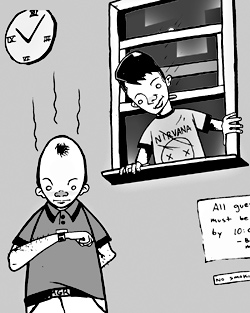Amidore Townsend, a 55-year-old mother of three grown daughters living on a monthly disability payment of $623, spends most of her days sitting on the couch. She suffers from chronic pain due to arthritis, bursitis, and other nerve-crippling ailments. Her medicine cabinet contains 17 bottles of prescription drugs she says she has to take each day, and she walks with a cane.
Yet last October, the Seattle Housing Authority terminated Townsend’s Section 8 voucher, which she used to live in the Juneau Townhouses in Rainier Valley. SHA contended that Townsend had been overpaid for about two years, so Townsend agreed to reimburse the agency $49 per month for two years. Her lawyer, Eric Dunn of the legal-aid provider Northwest Justice Project, says the only thing Townsend did wrong was send in the payment-plan agreement late.
Townsend says that SHA told her she sent in the wrong form, proving they got her payment because she sent her money order in the same envelope. “You’re going to take my housing from me just because I signed the wrong paper?” Townsend says. “Does that make any sense?”
Townsend unsuccessfully appealed her termination at a grievance hearing, an SHA proceeding where voucher holders can argue their case before a hearing officer, who acts as judge and jury. The tenant and SHA staffers attend, with both sides allowed witnesses, counsel, and supporting evidence for their cases.
According to the Tenants Union of Washington State, which is working in tandem with Northwest Justice, 219 hearings were held between January 2005 and October 2006. Only 13 tenants prevailed: That’s a 94 percent success rate for SHA. A single contractor—former Teamsters arbiter Larry Weldon—served as hearing officer at almost all of those 219 hearings.
“SHA has a hair trigger when it comes to kicking people out of the program,” says Dunn. “It’s a Kafkaesque proceeding. [The hearing officer] only listens to what the housing authority says.”
In an attempt to remedy this perceived malfeasance, Dunn filed suits on behalf of Section 8 tenants against SHA this past November and April in King County Superior Court, claiming that the housing authority is depriving voucher holders of constitutional due process at hearings. As a Tenants Union memorandum to SHA states, “SHA informal hearings…have produced written decisions containing insufficient factual-determinations or legal analysis to explain the reasons for the decisions [for termination].”
In the lawsuits, Dunn is seeking a moratorium on tenant terminations until SHA begins following what he considers proper due process. A hearing for one case was s et for May 1, but SHA filed a motion the day before to have the case moved to federal court, stalling Dunn’s suit for the time being. Dunn says that by getting rid of the elderly, limited-English speakers and the disabled (who qualify for the highest subsidies), SHA can bring in more “upwardly mobile” voucher holders, who won’t require as much subsidization and will be less likely to stay on the program in the long-term.
“Another, more modest cost saving from the terminations happens, because once a voucher is terminated, it can remain on the shelf for several months before it is issued to another family,” adds Dunn.
SHA general counsel James Fearn denies that there’s any “financial gain” to be realized by reallocating vouchers, since the HUD money has to be spent on the vouchers and administration costs anyway. But SHA spending on voucher allotments has trended down in the past three years. According to its own figures, SHA’s payments to landlords were $75.7 million in 2004, $68.2 million in 2005, and $62.3 million in 2006. The number of leased vouchers for those years was 6,942 in 2004, 6,890 in 2005, and 7,312 in 2006.
“The average housing assistance payment has gone down,” says Barbara Strayer, Section 8 manager for SHA’s Porchlight Housing Center. “We [can] house more people [by reducing each payment].”
To that end, SHA changed its occupancy standards in 2005. For instance, a single parent with two children of opposite sexes used to get subsidized for a three-bedroom unit. Now they get two bedrooms, according to Fearn.
Tenants Union organizer Emily Paddison says that SHA could be using terminations to clear out those who have the older, more generous vouchers so they can get new tenants in under the more stringent regulations. “That basically means that the more people they terminate under the old program rules, the more new vouchers they get [to] issue, and the less each voucher costs them,” she says.
At her hearing, Townsend says, magistrate Weldon didn’t bother with any of the papers she brought. “Didn’t even look at it,” a tearful Townsend says, pointing to her paperwork. “Didn’t even pick it up.”
Those documents would have demonstrated how preoccupied Townsend was with hospital visits and the pain her own body was inflicting on her when her paperwork issues arose. Weldon couldn’t recall the specifics of Townsend’s case when asked about it, but he maintains that he always regards evidence from both sides.
Still, advocates insist that tenants aren’t getting due process. At a meeting the Tenants Union held with Fearn and other SHA staffers on April 26, SHA refused the union’s demands to bring the hearing process up to legal standards.
The Tenants Union wants rotating hearing officers with legal backgrounds—as the King County Housing Authority uses—not just one hearing officer whose background is in arbitration, as is the case with Weldon. But, says Fearn, “The more money we spend on process, the less money we have to spend on housing.”
Fearn also fears that SHA would have to ramp up its own counsel at hearings, increasing costs even more. “Given that every Section 8 tenant has the right to a trial with all the formality involved…we don’t need to do it twice,” Fearn adds.
In reality, SHA probably wouldn’t have to go to court every time, given that most low-income people can’t afford lawyers. And HUD guidelines for hearings are on SHA’s side: Basically, as long as some kind of proceeding goes forth with evidence and witnesses heard on both sides, they’re in the clear. But advocates say that the housing authority has an obligation to go above and beyond what’s required to keep low-income families off the streets.
“It’s really interesting for a housing authority with a multimillion-dollar budget pointing and saying due process is a thing that is too expensive for [it] to provide,” says the Tenants Union’s Paddison.
When asked about Townsend, Fearn said he would personally look into her case. And even though he believes SHA’s hearing process is adequate, he admits mistakes can occur. But just as in trials, he adds, “The person who loses says, ‘They didn’t listen to me.'”
Without her Section 8 assistance of $471 per month, Townsend had to give up her apartment. Now she spends her days alone in the living room of her goddaughter’s Northgate residence, wrapped in a blanket to ward off the chills that exacerbate her arthritis.
“I just cry because, I mean, I’m really hurt behind it, and it’s not my fault,” she says. “I’m just tired. I really am. And I think they really done me wrong.”








